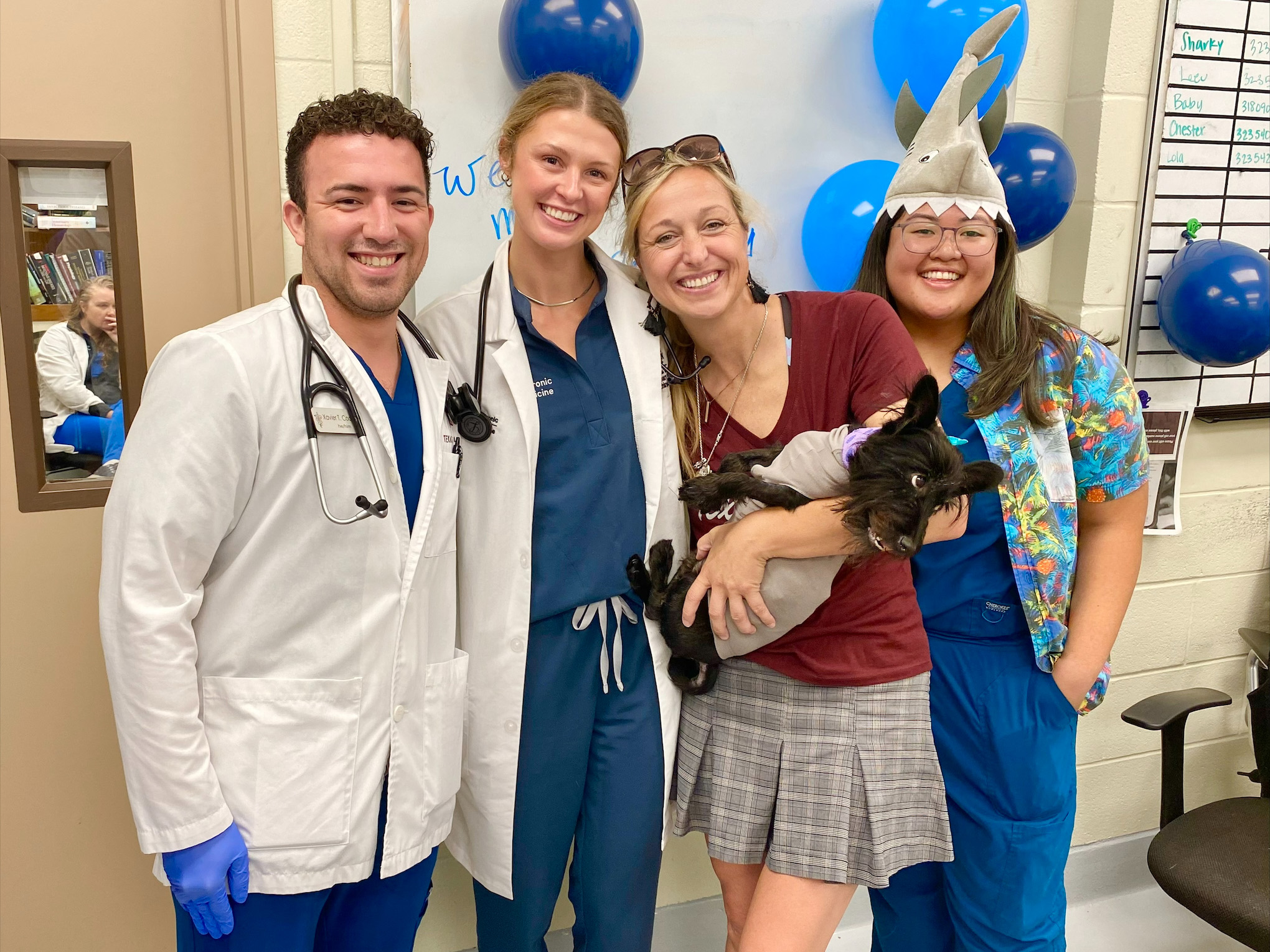Taking A Bite Out Of Diabetes: Texas A&M Veterinarians Save Therapy Dog Sharky
As a small animal veterinarian with experience in recognizing emergency cases, Dr. Brittany King knew to turn to the Texas A&M Small Animal Teaching Hospital (SATH) when her own dog, Sharky, developed a life-threatening complication from diabetes. Sharky, a 9-year-old Scottish terrier and schnauzer mix, had already proven that he was a fighter by overcoming […]
Murmur Mindfulness: Heart Murmurs In Young Pets
Thump-thump-swoosh-thump. Nothing may be scarier than being told that there has been a murmur detected in the heart of your cherished pet, but with proper monitoring and advice from a veterinarian, this irregular sound will have no power over the joyful well-being of your furry friend. Dr. Samantha Eisner, a second-year cardiology resident at the […]
Hearts United In A House Divided
After a Texas A&M University veterinary team saved his beloved border collie, a University of Kentucky Wildcats fan also began rooting for the Texas A&M Aggies. Robert “Bobby” Harrod is many things — a retired member of the emergency medical services (EMS), a border collie-loving pet owner, and a fan of the University of Kentucky’s […]
A College Student’s Guide To First-Time Pet Ownership
With the newfound independence and freedom a college student discovers, a desire to have a pet tag along for the adventure often follows. For these first-time pet owners, a furry friend can help them feel a stronger connection to their new home-away-from-home in the new chapter of their lives. Dr. Erin Ray, a clinical assistant […]
Fecal Transplants Reduce ADHD, Anxiety Symptoms In Dogs With Epilepsy, Texas A&M Researchers Find
Researchers from the Texas A&M College of Veterinary Medicine and Biomedical Sciences (VMBS) and Center for Systems Neuroscience in Hannover, Germany, have discovered that fecal microbiota transplants (FMT) can reduce negative mental health symptoms in dogs with epilepsy — especially in dogs with a version of epilepsy that is resistant to drugs. FMT is a […]
Understanding Degenerative Myelopathy In Dogs
Imagine watching your dog waddle into the room and noticing that he is walking on the top of his back paw. While you may classify it as a harmless quirk, in reality, that “knuckling” action can actually be a response to the dog’s neurological health in distress. Dr. Joseph Mankin, a clinical associate professor at […]
Helping Your Pet With Separation Anxiety
If you have ever lived in a household alongside a pet that excessively howls, scratches at the door, or exhibits an overall sense of panic when a loved one leaves the home, it can be beneficial to speak with a veterinarian about the potential diagnosis of separation anxiety. Dr. Lori Teller, a clinical professor at […]
How To Help Pets With Wobbler Syndrome
A slight wobble in your canine companion’s footsteps may be easily attributed to an exhausting day. Yet, when an exhaustion-induced misstep becomes routine, there can be an explanation found in the neurological health of your pup. Dr. Joseph Mankin, a clinical associate professor at the Texas A&M College of Veterinary Medicine & Biomedical Sciences, relays […]
Untangling The Web: How To Handle Spider Bites In Pets
While Spider-Man may have developed superhuman abilities from a spider bite, our pets are not likely to start slinging webs or crawling up the walls if bitten by an arachnid. Spiders tend to be active in late summer and early fall, leading to more unwanted encounters for our curious pets. Dr. Lance Wheeler, a clinical […]
Talk To The Paw: The Necessity of Paw Pads
Whether you see your pet’s footprints on the hood of your car, in the sand on the beach, or in a light blanket of snow, the indentions left behind by our furry friends’ paw pads are adorable. While we most often associate paw pads with cute critter prints, they’re also vital to our pets’ survival […]












